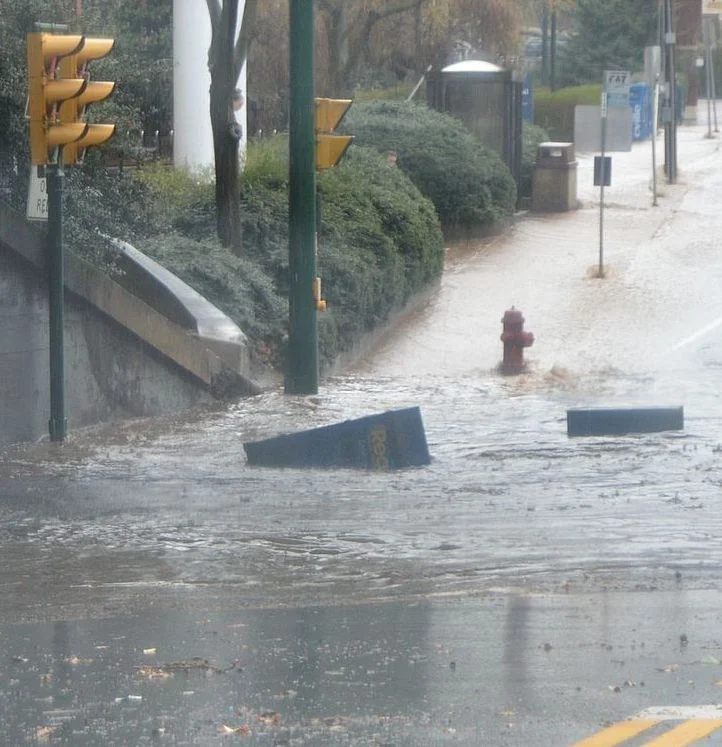
Public health officials widely agree that poor sanitation leads to an increase in diseases, particularly where there has been exposure to waters laden with raw sewage. These waterborne risks were made less severe through innovations in modern sanitary infrastructures, however they must be maintained over the years or these systems can revert to promoting hazardous circumstances. Also, changing environmental conditions such as increased rainfall events can easily overwhelm declining systems in often ignored urban neighborhoods such as those found in Baltimore, Maryland. The result? An increase in waterborne diseases and perhaps even COVID-19.
Frequent sanitary sewer overflows (SSOs) are a critical concern in areas that suffer great disrepair in their infrastructure. For a city like Baltimore—which already has the fourth largest number of COVID-19 related cases by county in the “free” state—the risks of ecological and public health are escalated when SSOs are especially prevalent. Major causes are poorly constructed and maintained wastewater systems that were originally built to handle critical sanitation-related operations. Wastewater infrastructures are typically designed to collect and transport all types of wastewater—from domestic to industrial—through a network of underground piping where it is then sent to be treated before being deposited into local waterways. However, during times of heavy rainfall regularly occurring around hurricane season, the raw sewage will be released due to the systems becoming overwhelmed.
As follows, these overflows are not just dangerous to the quality of our drinking water, they can cause further damage as they back up into homes and damage property. While we know a little more about COVID-19 in terms of its low infection rate in water, is there still an increased risk of contracting the virus due to aging wastewater treatment systems? Many other diseases such as Legionnaires’ and cholera spread readily through waterborne sources so improved infrastructure is still integral to public health, but are there still dangers associated with coronavirus?
Health officials confirm that the virus that causes COVID-19 has been detected in the feces of positively testing patients, prompting the CDC to make the connection between the disease and untreated wastewater. At present there is a lack of evidence to determine if a viral presence in untreated sewage is actually capable of infecting people, nor is it clear if infection is possible from contact with the feces of an infected person. Researchers believe danger of infection is likely low based on data on related coronaviruses, however what is clear is that when you add known waterborne infections resulting from SSOs to situations like the current pandemic, weakened gastrointestinal and respiratory systems can have a serious, negative impact on those infected with COVID-19.
The Chesapeake Bay Foundation reports that from 2011 to 2017 there were nearly 4,000 SSO events in the city of Baltimore, causing over 110 million gallons of sewage to spill into the streets and the city’s waterways before making its way into Chesapeake Bay. The problem will only get worse if measures are not taken to assess the dangers of sanitary overflows and the ensuing microbial exposures. Also important are concerted efforts to identify susceptible population areas and apply appropriate interventions—and innovations—to protect these overburdened communities.
So, how do we directly tackle the problem of aging infrastructure? Most importantly, there needs to be in place focused planning to avoid service interruptions and emergencies. These initiatives must be as comprehensive as possible by investigating the entire system, from intake to tap. Luckily, the EPA has developed a loan program associated with the Water Infrastructure Finance and Innovation Act (WIFIA) to help utilities finance critical repairs and upgrades. Through this act, eligible organizations will have access to low interest loans for wastewater infrastructure projects.
For information on our Ecosorb multifunctional adsorbent wastewater treatment products that provide superior filtration characteristics, click here.
Need help?
You can find the right application or product using our Tool, or through our Chat Bot.
Keep In Touch
Keep up to date with our latest news and announcements. Unsubscribe anytime.




.svg)
.svg)



